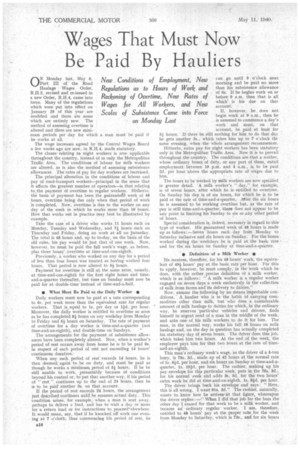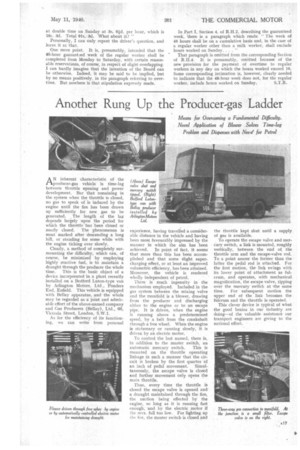Wages That Must Now Be Paid By Hauliers
Page 18

Page 19

If you've noticed an error in this article please click here to report it so we can fix it.
ON Monday last, May 6, Part III of the Road Haulage Wages Order, R.H.2, revised and re-issued in a new Order, R.H.4, came into force. Many of the regulations which were put into effect on January 29 of this year are modified and there are some which are entirely new. The method of assessing overtime is altered and there arc new minimum periods per day for which a man must be paid if he works at all.
The wage increases agreed by the Central Wages Board a few weeks ago are now, in R.H.4, made statutory. The clause relating to night workers is now applicable throughout the country, instead of in only the Metropolitan Traffic Area. The conditions of labour for milk workers are altered, as is also the method of assessing subsistence allowances The rates of pay for day workers are increased. The principal alteration in the conditions of labour and pay of road-transport workers—principal in the sense that it affects the greatest number of operators—is that relating to the payment of overtime to regular workers. Hitherto, the basis of payment has been the guaranteed week of 48 hours, overtime being due only when that period of work is completed. Now, overtime is due to the worker on any day of the week in which he works more than 10 hours. How that works out in practice may best be illustrated by example. Take the case of a driver who works 11 hours each on 'Monday, Tuesday and Wednesday, and 7i hours each on Thursday and Friday, doing no work at all on §aturday. The total is 48 hours and, up to to-day, on the basis of the old rules, his pay would be just that of one week. Now, however, he must be paid the full week's wage, as before, plus three hours' overtime at time-and-one-eighth. Previously, a worker who worked on any day for a period of less than four hours was treated as having worked four hours. That period is now altered to 5i hours. Payment for overtime is still at the same rates, namely, at time-and-one-eighth for the first eight hours and timeand-a-quarter thereafter, but time on Sunday must now be paid for at double-time instead of time-and-a-half.
• What Must Be Paid to the Daily Worker • Daily workers must now be paid at a rate corresponding to 6s. per week more than the equivalent rate for regular workers. That is,equal to Is. per day or lid. per hour. Moreover, the daily worker is entitled to overtime so soon as he has completed 8i hours on any weekday from Monday to Friday and 5i hours on Saturday. The rate of payment of overtime for a day worker is time-and-a-quarter (not time-and-an-eighth), and double-time on Sundays. " The arrangements for the payment of subsistence allowances have been completely altered. Now, when a worker's period of rest occurs away from home he is to be paid 6s. in respect of each period of rest not exceeding 14 hours' continuous duration.
When any such period, of rest exceeds 14 hours, he is then deemed, again to be on duty, and must be paid as though he works a minimurq period of 51 hours. If he be still unable to work, presumably because of conditions beyond his control or, to put that another way, if his period of "rest" " continues up to the end of 24 hours, then he is to be paid another 3s. on that account. If the period of rest exceeds 24 hours, the arrangement just described continues until he resumes actual duty. This condition arises, for example, when a man is sent away, perhaps to deliver a load, and has to wait a day or more for a return load or for instructions to proceed-elsels-here. It would mean, say, that if he knocked off work one evening at 7 o'clock, thus. commencing his period of rest, he can go until 9 o'clock next morning and be paid no more than his subsistence allowance of 6s. If he begins work on or before 9 a.m. then that is all whichis his due on that account.
If, however, he does not begin work at 9 a.m., then he is assumed to commence a day's work and must, on that account, be paid at least for 5i hours. Ifthere be still nothing for him to do that day he gets another 3s., which takes him up to 7 o'clock thf same evening, when the whole arrangement recommences. Hitherto, extra pay for night workers has been statutory only in the Metropolitan Traffic Area. Now it is to prevail throughout the country. The conditions are that a worker, whose ordinary hours of duty, or any part of them, entail employment between 10 p.m. and 4 a.m., is to be paid 2d. per hour above the appropriate rate of wages due to him.
The hours to be worked by milk workers are now specified in greater detail. A milk worker's " day," for example, is of seven hours, after which he is entitled to overtime. On Sunday his day is of six hours, for which he is to be paid at the rate of time-and-a-quarter. Alter the six hours he is assumed to be working overtime but, as the rate of pay is still time-and-a-quarter, there does not appear to be any point in limiting his Sunday to six or any other period of hours.
Special consideration is, indeed, necessary in regard to this type of worker. His guaranteed week of 48 hours. is made up as follows :—Seven hours each day from Monday to Saturday inclusive and six hours on Sunday. For the hours worked during the weekdays he is paid at the basic rate and for the six hours on Sunday at time-and-a-quarter.
• Definition of a Milk Worker • He receives, therefore, for his 48 hours' work, the equivalent of 49i hours' pay at the basic rate per hour. For this to apply, however, he must comply, in the work which he does, with the rather precise definition of a milk worker, which is as follows: " A milk worker is a regular worker engaged on seven days a week exclusively in the collection of milk from farms and its delivery to dairies."
Now, assume the following by no means improbable conditions, A haulier who is in the habit Of carrying commodities other than milk, but who does a considerable
• amount of milk haulage to dairies for which, in the ordinary way, he reserves particular vehicles and drivers, finds himself in urgent need of a man in the middle of the week, and asks one of his milk workers to do it for him. The man, in the normal way, works his full 48 hours on milk haulage and, on the day in question has actually completed his statutory day of seven hours. The driver does this job, which takes him two hours. At the end of the week, the employer pays him for that two hours at the rate of timeand-an-eighth.
This man's ordinary week's wage, as the driver Of a 5-ton lorry, is 75s. 3d., made up of 42 hours at the normal rate of ls. 61d. per hour, and six hours on Sunday at time-and-aquarter, ls. 10id. per hour. The cashier, making up his pay envelope for this particular week, puts in the 75s. 3d., for his normal ..yeels and adds 3s. 5d. for the two hours' extra work be did at time-and-an-eighth, Is. 84d. per hour.
The driver brings back his envelope and says : "Here, this is all wrong. I want 91s. 3d." The cashier, naturally, wants to know how he arrives. at that figure, whereupon the driver replies:—" When I did that job for the boss the other day I ceased for that week to be a milk worker, and became an' ordinary regular worker. I am, therefore, entitled to 48 hours' pay at the proper rate.for the week from Monday to Saturday, which is 73s., and for six hours
at double time on Sunday at 3s. Old. per hour, which is 18s. 3d. Total 91s. 3d. What about it? "
Personally, I can only repeat the driver's question, and leave it at that.
One more point. It is, presumably, intended that the 48-hour guarant,.ed week of the regular worker shall be completed from Monday to Saturday, with certain reasonable reservations, of course, in respect of slight overlapping. I can hardly imagine that the intention of the Board can be otherwise. Indeed, it may be said to be implied, but by no means positively, in the paragraph referring to overtime. But nowhere is that stipulation expressly made.
In part I. Section 4, of R.H.2, describing the guaranteed week, there is a paragraph which reads: "The week of 48 hours shall be on a cumulative basis and, in the case of a regular worker other than a milk worker, shall exclude hours worked on Sunday. . . . "
That paragraph is omitted from the corresponding Section of R.11.4. It is presumably, omitted because of the new provision for the payment of overtime to regular workers in any day on which the hours worked exceed 10. Some corresponding intimation is, however, clearly needed to indicate that the 48-hour week does not, for the regular worker, include hours worked on Sunday. S.T.R.




























































